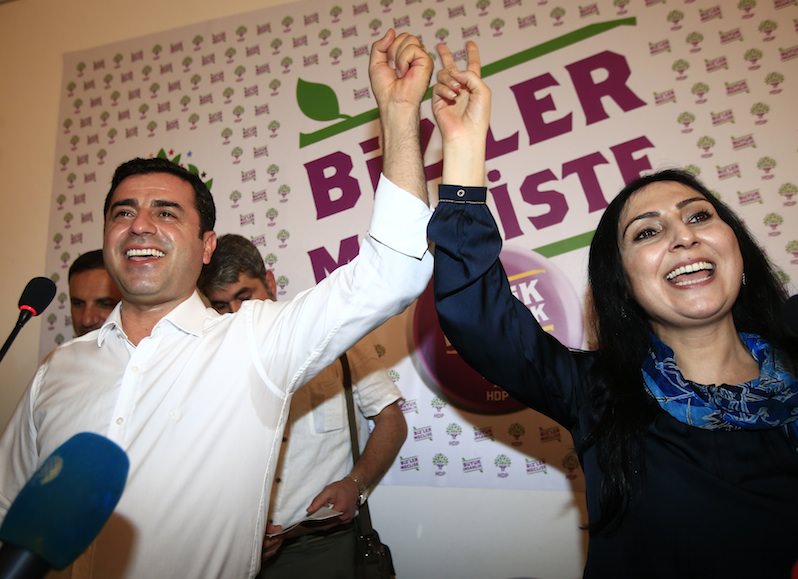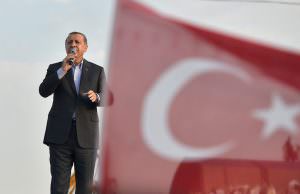The Rise of a New Left in Turkey?
The rise of the Peoples' Democratic Party (HDP) made waves in socially conservative Turkey by championing gay rights, women's rights and leftist causes like labor and a "normalization" of the Turkish majority's relationship with the Kurdish population. Selahattin Demirtas, left, and Figen Yuksekdag, co-chairs of the pro-Kurdish Peoples' Democratic Party (HDP), celebrate after an election-day news conference Sunday. (Lefteris Pitarakis / AP)
Selahattin Demirtas, left, and Figen Yuksekdag, co-chairs of the pro-Kurdish Peoples' Democratic Party (HDP), celebrate after an election-day news conference Sunday. (Lefteris Pitarakis / AP)
In the name “Peoples’ Democratic Party” (HDP), the word “peoples” (halklar) is plural, insisting on ethnic pluralism. The party just won 13 percent of the votes in Turkey’s parliamentary election, thereby denying an absolute majority to the ruling center-right Justice and Development Party (AKP). It made waves in socially conservative Turkey by championing gay rights, women’s rights, leftist causes like labor and a “normalization” of the Turkish majority’s relationship with the 20 percent of the population that is Kurdish. The party has female and male co-leaders, Figen Yuksekdag and Selahattin Demirtas. Among its primary goals, now achieved, was ensuring that President Tayyip Erdogan’s party, the AKP, could not change the Constitution and impose a presidential system on the country.
Demirtas insisted that his opposition to a presidential system was a matter of principle (parliamentary systems are typically more pluralist) and did not derive from any grudge match with Erdogan. But his disdain for the latter’s politics of the religious right comes across in an interview at the beginning of this month with Hurriyet (its English outlet is the Hurriyet Daily News). He slammed Erdogan for his criticism of the HDP for putting up an openly LGBT candidate, Baris Sulu, as a candidate. The president, Demirtas complained, “speaks this way because he wants to humiliate them. Homosexuals would pass the 10 percent threshold even more comfortably than us if they would form a political party. His humiliation of people for their sexual orientation was very ugly.” He also went after Erdogan for his increasingly theocratic diction, saying he appeared to want to revive the Ottoman Empire, with himself as a latter-day “caliph.”
READ: Iraq’s Horrors by the Numbers: Has Islamic State Killed 50,000 People in One Year?
Even more vehement about Erdogan has been HDP co-chair Yuksekdag, who took strong exception to Erdogan’s pronouncement last November that “You cannot bring women and men into equal positions; that is against nature because their nature is different.” She observed acidly, “In the 21st century, one mentality says, ‘Women and men are not equal, this is against their nature.’ The other sells women at slave bazaars.” She was implicitly (and somewhat unfairly) comparing the president with Islamic State. But the HDP women’s platform stands not just for middle-class feminists but for women in the workforce, advocating new rights to organize labor unions. Turkey’s workers have long been repressed, and union membership has plummeted in the years of center-right Justice and Development dominance. HDP wants to turn that situation around, for both male and female workers.
Late in the campaign for the June 7 elections, HDP women at an Erdogan rally literally turned their backs on him. He addressed them from his dais, saying, “It is very interesting that a group here … I beg your pardon but my decency does not permit me to put it another way … turned their backs on me while making the victory sign.” His critics accused him of appearing to resort to a sexual innuendo implying that they liked it from behind. Secular and leftist women, including Yuksekdag, launched a campaign on social media in which hundreds of thousands of women put up pictures of themselves with their backs turned.
HDP appears to have attracted some voters from the secular Republican People’s Party, representing the old urban elite that ran the country in the 20th century. But it also benefited from its pro-Kurdish stance among conservative, religious Kurds, who used to vote for Erdogan’s AKP. This ability to pull together a varied coalition, including women and youth, caused its campaign to be compared with that of Barack Obama in 2008. Many youths had been alienated from Erdogan by his party’s harsh crackdown on protesters attempting to save Gezi Park from development in the summer of 2013.
The HDP has its origins in left-wing Kurdish politics, but co-chair Demirtas made the astute move to have the party also represent ethnic Turks, both women and men, of a secular or leftist mindset who were upset with Erdogan’s increasingly strident Muslim nationalism. In an interview, Demirtas pledged that his party would not turn to ethnic-based politics if it won but intead would continue with its pluralist politics of inclusion. “If we give up of this rhetoric after the elections,” he said, “it’s the HDP who will be the main loser. We will not fall behind the bar we raised.” More and more ethnic Turks were coming to HDP rallies in the months before the elections, waving Turkish flags. Demirtas is proud of this accomplishment, observing, “We have created a basis for Kurds and Turks to communalize the Kurdish issue and to resolve it through democratic means.”
About 20 percent of Turkish citizens are ethnic Kurds, and they predominate in the poor, hardscrabble southeast of the country. Millions, however, have migrated as laborers to work in light textile and other industries in the prosperous cities of Turkey’s west. Turkish is a Central Asian language, whereas Kurdish is Indo-European; but all Turkish Kurds have had their education in Turkish and are fluent in it. Opinion polling suggests that most Turkish Kurds favor a peace process integrating them into Turkey. In the 1980s and until about 2003, the Kurdistan Workers Party (PKK) waged a guerrilla struggle against the Turkish state, to which the military replied with a dirty war. Some 30,000 are thought to have died in this violent confrontation. The PKK says it has moved away from its initial Marxism and separatism, proposing a left-libertarian confederalism; and its leaders, based in Qandil in Iraq, say they approve of the HDP’s attempt to enter ordinary Turkish politics.
The rise of the HDP heralds a revival of the Turkish left, which fell on hard times after the 1980 military coup that went after activists and unions, after 30 years. About 17 percent of the new parliament will be women, an unprecedentedly high proportion, and Armenians and a member of the small Yazidi religious minority were elected on the HDP ticket. The party’s explicitly pluralist message and its championing of disadvantaged groups open a space in public discourse in which issues that had long been swept under the rug can be discussed in public. Even Turkey’s press, which had in recent years been intimidated by Erdogan’s authoritarianism, is openly publishing on HDP issues.
Your support matters…Independent journalism is under threat and overshadowed by heavily funded mainstream media.
You can help level the playing field. Become a member.
Your tax-deductible contribution keeps us digging beneath the headlines to give you thought-provoking, investigative reporting and analysis that unearths what's really happening- without compromise.
Give today to support our courageous, independent journalists.



You need to be a supporter to comment.
There are currently no responses to this article.
Be the first to respond.